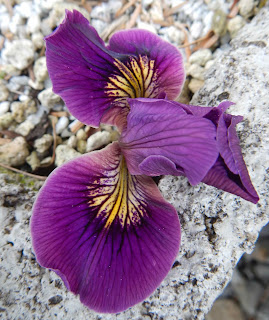by Kathleen Sayce
Rain was due on the night of May 1, so I went out before dark to take photos of first flowers that opened that day and the day before from one seed lot that was described in the Society for Pacific Coast Native Irises seed list a couple of years ago as having a pod parent with dark rose and gold signal flowers.
The seeds were from Debby Cole's garden on Mercer Island near Seattle. These were the first flowers I have seen from this seed group.
More than two decades ago, I had plans to select for new Pacifica iris with weather-resistant petals and clear, well-saturated colors that were adapted to my local climate. In the intervening years, I found that said climate is not conducive to hand pollination, or at times any pollination at all, of Pacifica irises. To put this simply, it's usually too wet and windy to hand pollinate Pacificas when modern hybrids are in flower.
I tried small protective covers of twin-wall polycarbonate, weighted down with bricks to keep the wind from pulling them off and sailing them around the yard. Nope, still too windy; and often, the rain is horizontal, even in April and May. Flowers blow off stems, petals melt, or pollen simply does not germinate on the styles.
These days, I get seeds from the SPCNI seed catalog and enjoy the fruits of other gardens instead. So here's what I have so far in 2022:
The next flower is a lovely medium rose, dark rose veins on the falls, gold signal. It too has nice substance. What will the rain do to this one?
Darker rose, wider petals, and much darker rose veining to the petal tips, an interesting signal with a white outer area and a gold inner area. This iris is intriguing for the complexity of the falls, and its darker rose color.
The last one is a good example of what goes astray between one's intentions in hybridizing and reality. While I was trying to focus on the dark falls, I knocked this flower off the stem! Luckily, there is another flower on the same stem, and another stem still developing. While the coming storm won't help me see how it survives rain, the next few flowers may.
It has smaller petals than the other three with nice substance to them, as irises with simpler petals seem to have. There is also an interesting hint of paler color on the developing style arms--we'll have to wait for the next flowers to know for sure.
So there you have it: four out of eighteen pots, all with different flowers!




No comments:
Post a Comment